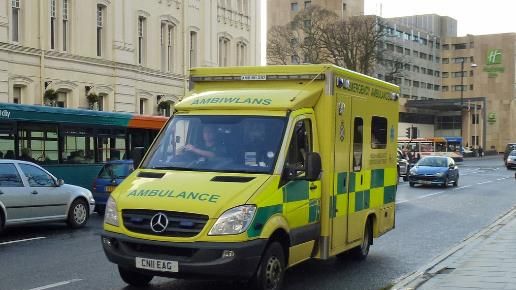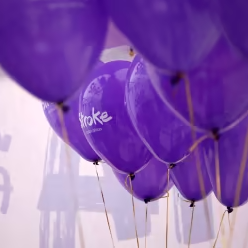
Press release -
Stroke rates soar among men and women in their 40s and 50s
The number of strokes occurring in men aged between 40 and 54 has rocketed by almost 50% in less than 15 years, according to the Stroke Association.(i)
An analysis of hospital admission data by the charity, to mark Action on Stroke Month 2015, reveals that in 2000, there were over 4,260 hospital admissions for stroke among men aged between 40 and 54 in England. This figure soared to 6,221 in 2014 – an increase of 46%. It is thought that the rise is due to increasing sedentary and unhealthy lifestyles, and changes in hospital admission practice.
The charity’s research shows the number of women aged 40-54 admitted to hospital after a stroke in the last 15 years has also dramatically increased by almost a third (30%) - from 3,529 in 2000, to 4,604 in 2014.(ii) Overall, the number of strokes occurring in people of working age (20-64) has risen by a quarter within the past 15 years.(iii)
Jon Barrick, Chief Executive of the Stroke Association, said: “These figures show that stroke can no longer be seen as a disease of older people. There is an alarming increase in the numbers of people having a stroke in working age. This comes at a huge cost, not only to the individual, but also to their families and to health and social care services.
“The simple truth is that we must do more to raise people’s awareness of risk factors, to help prevent them from having a stroke. With many more stroke patients now receivingemergency medical treatment, we also need the right health and social care services available. People must have the support they need to make the best possible recovery and avoid having to cope for decades with the disabilities that stroke can bring.”
The charity is warning that the rise in working age stroke means more people will be forced to live with the heavy financial impact of the condition. Stroke survivors unable to return to work can struggle to cope with a fall in income, increased household bills and a benefits system which does not recognise the full impact of stroke. Overall, stroke costs the UK economy around £9bn a year. Loss of income, due to death and disability from stroke alone, is over £1.3billion each year.(iv)
A survey of businesses regarding their attitudes on the impact of stroke on their staff, for Action on Stroke Month 2015, showed that:(v)
Just one in 20 employers recognised cognitive difficulties as a symptom of stroke.
When asked why businesses might be reluctant to employ a stroke survivor, two fifths (42%) said that they would have concerns about the impact of a stroke on an employee’s ability to carry out their role.
Half (50%) had not heard of the Government’s Access to Work Scheme.(vi)
Jon Barrick said: “Having a stroke is bad enough, but being written off by your employer through a lack of understanding can be catastrophic. Businesses play a crucial role in helping stroke survivors get back into the workplaceand on the road to recovery. That’s why we’re calling on employers to be aware of the physical and emotional impact of stroke.”
Brendan Roach, Senior Disability Consultant at Business Disability Forum, added: “Our experience of working with organisations for over 20 years demonstrates that businesses with an effective and well publicised process for making disability-related workplace adjustments are best placed to meet the challenge of risings rates of stroke. That’s why we’re supporting the Stroke Association’s work to encourage employers to understand the needs of stroke survivors and become ‘disability-smart’.”
The Stroke Association provides advice and practical support to help stroke survivors return to employment. For more information, visit www.stroke.org.uk or call 0303 303 3100.
Ends
For further information, case studies, interviews and images, please contact the Stroke Association’s media team on 020 7566 1500 or email press@stroke.org.uk
For urgent out of hours media enquiries only, please call 07799 436 008. ISDN facilities available.
Notes to editors:
(i) Health and Social Care Information Centre. (2015). Count of Finished Admission Episodes with a primary diagnosis of Cerebrovascular diseases (I60-I69) for the years 1998-99 to 2013-14. Bespoke requested data, March 2015. (Data available for England only).
(ii) Health and Social Care Information Centre. (2015). Count of Finished Admission Episodes with a primary diagnosis of Cerebrovascular diseases (I60-I69) for the years 1998-99 to 2013-14. Bespoke requested data, March 2015. (Data available for England only).
(iii) Health and Social Care Information Centre. (2015). Count of Finished Admission Episodes with a primary diagnosis of Cerebrovascular diseases (I60-I69) for the years 1998-99 to 2013-14. Bespoke requested data, March 2015. (Data available for England only).
(iv) Saka O, McGuire A, Wolfe C. (2009). Cost of stroke in the United Kingdom. Age and Ageing (2009).
(v) Opinium Research LLP poll carried out with 500 senior managers in small and medium sized businesses (less than 250 employees) in the UK.
(vi) The Access to Work Scheme provides support to people who have a disability that makes working a problem. The scheme provides practical advice and support to help people overcome work-related obstacles. For more information, visit: https://www.gov.uk/access-to-work
A stroke is a brain attack which happens when the blood supply to the brain is cut off, caused by a clot or bleeding in the brain. There are around 152,000 strokes in the UK every year and it is the leading cause of complex disability. There are around 1.2 million people in the UK living with the effects of stroke.
Stroke Association is a charity. We believe in life after stroke and together we can conquer stroke. We work directly with stroke survivors and their families and carers, with health and social care professionals and with scientists and researchers. We campaign to improve stroke care and support people to make the best recovery they can. We fund research to develop new treatments and ways of preventing stroke. The Stroke Helpline (0303 303 3100) provides information and support on stroke. More information can found at www.stroke.org.uk.
The Business Disability Forum (BDF) represents some 300 organisations that employ 20% of the UK workforce. Smart organisations work with BDF to improve their business performance. BDF has more than twenty years’ experience of equipping people with the expertise to create confident organisations by improving the understanding of disability in business, removing barriers and making adjustments for individuals. For more information, visit www.businessdisabilityforum.org.uk.
Topics
Categories
A stroke is a brain attack which happens when the blood supply to the brain is cut off, caused by a clot or bleeding in the brain. There are around 152,000 strokes in the UK every year and it is the leading cause of severe adult disability. There are over 1.2 million people in the UK living with the effects of stroke.
Stroke Association is a charity. We believe in life after stroke and together we can conquer stroke. We work directly with stroke survivors and their families and carers, with health and social care professionals and with scientists and researchers. We campaign to improve stroke care and support people to make the best recovery they can. We fund research to develop new treatments and ways of preventing stroke. The Stroke Helpline (0303 303 3100) provides information and support on stroke. More information can be found at www.stroke.org.uk











